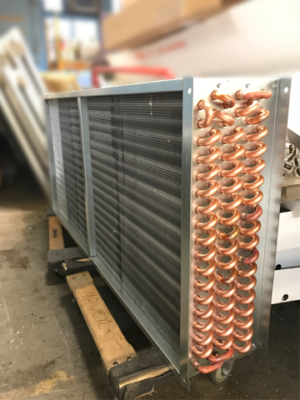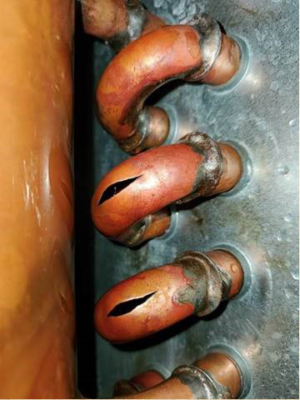More Customers Looking to Nationwide Coils Post Mid-February Storm that Gripped Central and Southern U.S.
The winter storm that brought frigid temps, ice and snow across the central and southern states for an extended duration, froze many commercial HVAC coils in its path. With the region now thawed and a few weeks into recovery, businesses are working to replace their coils to get their HVAC systems back up and running.

Last month’s arctic blast that struck the central U.S. — and hit Texas particularly hard — was certainly one for the record books. Subzero temps blanketed the region for days on end, leaving unprecedented numbers without power, heat and water. For a cold snap of this magnitude, commercial HVAC coils were certainly not spared. Coils used in this region simply aren’t built to withstand subzero temperatures for that long, and now businesses and industries are scrambling to have their coils replaced.
Since the storm, the coil manufacturing industry has been running at 100% trying to meet capacity while navigating additional supply chain hiccups caused by the storm. Orders for our custom and OEM replacement coils have spiked as people focus on getting their HVAC systems operational as quickly as possible. Aside from basic climate control needs, maintaining high indoor air quality standards amidst the ongoing COVID-19 crisis is still a priority.

A Nationwide Coils replacement water coil on its way to a school in Dallas/Ft. Worth.
Quality Custom and OEM Replacement Coils
If you’re one of the many needing to replace a coil rendered inoperable due to freezing, our custom replacement coils are designed to match every detail of your existing coil for a perfect fit and optimal performance. Our OEM replacement coils are proving to be a smart choice for a region hit hard economically in the wake of the storm, saving customers about 30% to 50% less than most OEM coils.
With offices across the U.S., including the Texas region, we can measures on-site in many areas. Should you be taking the measurements for your new coil, our blank coil drawings give you the tools you need to obtain a precision fit.
Get Your Coil Faster With Quick Ship
To meet the increase in demand, our quick ship option gives customers the ability to get their coils in faster turnaround times. Although the storm has brought supply chain challenges, rest assured, Nationwide Coils is working around the clock to serve customers and fulfill orders as quickly as possible.
Freezing Coils Tips
Since the mid-February storm, and with another late-season winter storm on its way for much of the country, we’ve received inquiries from customers across the U.S. about the potential of coils freezing and how to avoid it.

Copper tube damage as a result of the coils freezing.
At what temperature will coils freeze?
A lot factors in to the temperature a water coil can freeze, including:
• Water flow through the coil
• Whether the system is running or not (on vs. off)
• The percent of outside air the unit takes in
• Whether the unit has glycol in its system or not, as glycol offers added freeze protection
What happens to a unit when its coil freezes?
If your coil freezes, the unit will not be operational.
What happens when a frozen coil defrosts?
This is when the mess starts. The water leaks through the cracked tubes and depending on water flow and the amount of leaks, it can cause considerable damage.
What types of coils are built for subzero temperatures?
Steam distribution coils are most suitable for low temperatures. The inner distribution tube reduces the likelihood of the outer condensate tube freezing.
What is the best preventative maintenance to keep coils from freezing?
The most effective way to keep coils from freezing is through proper freeze protection:
1. Add a mixture of glycol and water to the system. This will lower the freezing point of the fluid.
2. Coils without freeze protection should be located downstream of heating coils.
3. Use Freezestat to indicate if sub-freezing air is being encountered by an unprotected coil. This can indicate a heating failure and will shut down the system to protect the coil. Bypass pumps turn on when the outdoor air is near freezing to send fluid through the coil at a set GPM to reduce the chances of freezing.
Have a question or need a quote on a replacement commercial HVAC coil? Email us anytime.








